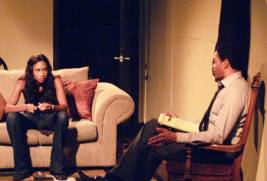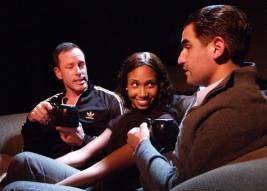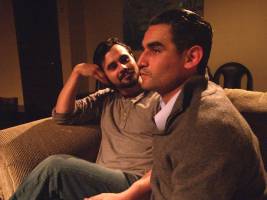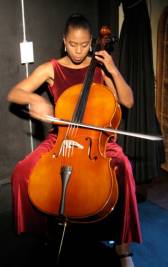
Lydia R. Diamond’s Stick Fly was one of the biggest critical successes of last year’s theater season, scoring nominations and/or wins at L.A.’s Big Three award ceremonies—the Ovations, the LADCCs, and the LA Weeklys.
Diamond’s gripping drama centered around an African American family different from those usually depicted on stage or screen—a wealthy bunch of Manhattanites having a weekend get-together at their Martha’s Vineyard home-away-from-home.
Now, one of the playwright’s earlier works, The Gift Horse, has opened in Hollywood, and though it’s not quite at the level of Stick Fly, it is nonetheless a beautifully written, thoroughly entertaining drama (with comedic interludes). As revived by the producer-director team of Bianca Chen and Benjamin Haber Kamine, who recently brought back Don Nigro’s Seascape With Shark And Dancer to positive notices, The Gift Horse is an often compelling look at a different kind of African American heroine.
Actually there are two black heroines in The Gift Horse. One is Ruth, an attractive, intelligent , vivacious co-ed whose life and loves we’ll be following over the course of the play’s two acts. The other is Jordan, a talented cellist who often addresses and engages the audience from the sidelines, but whose identity is not revealed until the play’s final, emotion-packed scenes.
Ruth may not come from as well-to-do a family as the LeVays in Stick Fly, but she’s had a comfortable upbringing (her father is a psychiatrist), at least on the surface. What secrets lie beneath may not be such nice ones, however.
Early on in the play, we meet the two men in Ruth’s life. One is Ernesto (aka Ernie), a gay Latino she meets in college who becomes her best friend and platonic soul mate. The other is Brian, the African American therapist she begins seeing in an attempt to resolve issues that are preventing her from moving forward in her life.
The Gift Horse moves back and forth in time, as Ernesto begins dating blond, blue-eyed Bill, who would seem to be the man of his or any other gay man’s dreams, and as Ruth’s meetings with Brian reveal to us a complex young woman whose past may not have been as rosy as we may initially have assumed.
Under Kamine’s assured direction, a fine cast bring Diamond’s words to absorbing life. Associate producer (with Kamine) Ajarae Coleman makes for a vivacious, likeable Ruth. Though her rapid-fire speech patterns take a while to get used to, they end up becoming part of Ruth’s rather hyper personality, and in dramatic scenes late in the play, Coleman digs deep to show the full measure of Ruth’s pain.
In the role of Brian, Horace V. Rogers (of the original Broadway casts of both Tarzan and Brooklyn, no less) proves himself as adept at drama as he must be at musical theater. His therapist-patient relationship with Ruth has the ring of authenticity, as do the romantic sparks that ignite between them.
Steven Koller (Bill) and Abraham Smith (Noah) both do effective work as the men in Ernie’s life, and it says something about the progress made by the LGBT movement that a pair of gay characters are being played by a) an openly gay actor (Koller dedicates his performance to his “loving and understanding husband”) comfortable enough in his own skin to be out in his career, and b) a straight actor (Smith mentions his “lovely wife Jocelyn” in his bio) comfortable enough in his own skin to commit totally to (and be convincing in) a romantic gay role.
Nina Daniels is terrific as Jordan, warm and sassy in her one-on-ones with the audience, and she plays a mean cello to boot. If The Gift Horse hasn’t been seen since its 2002 world premiere, it’s perhaps because how many fine dramatic actresses are also versed in the cello—and happen to be the right age and race as well? Chen and Kamine indeed struck pay dirt when they found Daniels.
Finally, there is the absolutely wonderful work of Arturo Aranda as Ernesto. There’s not a false note in Aranda’s deeply felt performance, in his journey from floppy-haired college kid to well-groomed, self-confident adult. If the audience starts out liking Ernie and ends up loving him, it’s as much due to Aranda in the role as it is to Diamond’s fine writing.
As to the mysterious Jordan’s role in the proceedings, there are a few clues early on in the show, but nothing to give away the profoundly moving ending that Diamond has up her sleeve. (It wasn’t until I saw a script after the performance that confusion was cleared up as to why Daniels called one of the characters “Theo.” Perhaps a more Anglicized pronunciation of the word she’s actually saying would help clear up any misunderstanding.)
Though The Gift Horse has been staged at only a fraction of Stick Fly’s budget, Aviva Fersht’s set design (representing various locations including Ernesto’s apartment and Brian’s office) does its job effectively. Austen Hoogen’s lighting is very good as well, as are Talia Tsouros-Cadabona’s costumes, Mallory Lopez’s props, and Kamine’s sound design. Hope Easton gets credit as cello consultant. Mallory Lopez is production stage manager, with Heather Gonzalez having served as rehearsal stage manager.
Having seen both Stick Fly and The Gift Horse, I confess to having become a bona fide Lydia R. Diamond fan. Hopefully this latest production of her work will get the attention it deserves. And here’s a side note to busy theatergoers. In addition to the usual Friday, Saturday, and Sunday night performances, The Gift Horse also plays on Mondays at 7:00, thereby eliminating any excuses for missing this very satisfying evening of theater.
Working Stage Theatre, 1516 N. Gardner Street, Hollywood.
www.gifthorsetheplay.com/tickets
–Steven Stanley
May 3, 2010






 Since 2007, Steven Stanley's StageSceneLA.com has spotlighted the best in Southern California theater via reviews, interviews, and its annual StageSceneLA Scenies.
Since 2007, Steven Stanley's StageSceneLA.com has spotlighted the best in Southern California theater via reviews, interviews, and its annual StageSceneLA Scenies.







 COPYRIGHT 2025 STEVEN STANLEY :: DESIGN BY
COPYRIGHT 2025 STEVEN STANLEY :: DESIGN BY